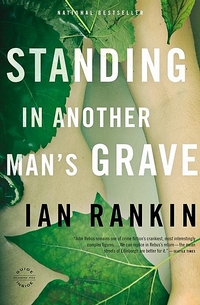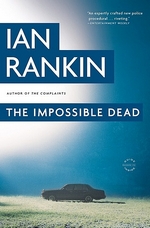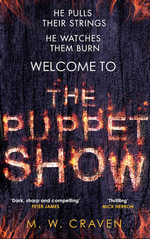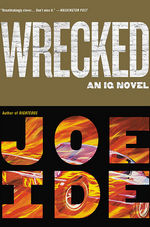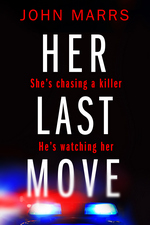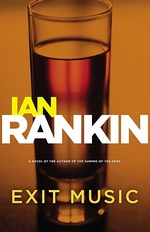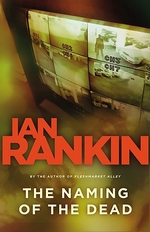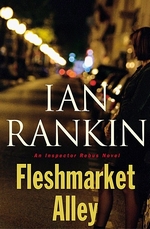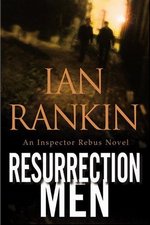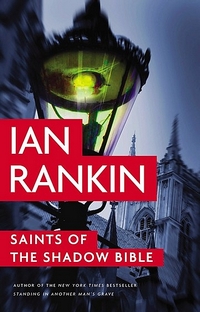 Saints of the Shadow Bible
Saints of the Shadow Bible
by Ian Rankin
Series: John Rebus, #19
Hardcover, 389 pg.
Little, Brown and Company, 2013
Read: April 15 – 17, 2019

| Rebus said quietly. “It made sense that we stuck up for one another back then–might not be so true now.”. . .
“. . . secrets and lies and all the other crap we’ve dealt out and been dealt. I didn’t see you owning up in there to singing your name to statements that weren’t yours. But we both know it happened a lot happened back then, and one crack in the dam might be all that’s needed . . .” Patterson paused, looking Rebus up and down. “So make sure you know whose side you’re on John.” |
Rebus is officially un-retired, and very happy (at least by his standards). To be reinstated, he had to agree to be a Detective Constable again, instead of an Inspector. But he was willing (and usually still is) to take the rank cut so that he keep working. For anyone who’s read a Rebus book or two, this makes perfect sense. Buying books he doesn’t read, listening to his music collection, and police work — that’s all he has in his life. Well, okay, smoking and drinking, too. But those two can only occupy so much time.
Serving as a DC, he investigates a car that went off the road for no good reason on a straight stretch with DI Siobhan Clarke. It doesn’t take the two long at all to determine that what happened at the scene is as obvious as everyone else thinks (everyone but readers, because we all know that Rebus and Clarke together at a scene = more than meets the eye). They were called in because someone with influence exerted that influence at got detectives to investigate a seemingly routine auto accident that injured a young woman. Within days, there’s a more serious crime related to their investigation, and the two are plunged into a veritable minefield of money, politics, and family secrets.
Meanwhile, Malcom Fox is working his last Complaints case before being reorganized into detective work. He asks Clarke for help in approaching Rebus for some information related to the case. He’s looking into a murder case related to the group where Rebus served his first assignment as a rookie detective. Rebus is initially resistant to help Fox nab one of his old friends, but soon begins to think that Fox is onto something and works the case with him.
Watching the rapprochement between Rebus and Fox is great — at times it feels like things used to when Rebus was working with Clarke (in the latter stages, when they were more like equals). Fox and Clarke’s burgeoning friendship is a lot of fun to read, too. Basically, Fox’s addition to this world in general is something to be praised. I’m not 100% sold on Clarke’s rise, she almost seems more like Gill Templar than herself at times. Now, at one point, Clarke might have taken that as a partial compliment, but I don’t think so. She retains her sense of humor and instincts, but her commitment to the job might be more powerful than those instincts.
Over the last couple of books, one of the most interesting things is the rise of Darryl Christie in the Edinburgh crime world. He’s back in these pages. Not as Rebus’ target, but a presence — like Cafferty so often was. Time moves on and the young move up on both sides of the law. But as Rebus can’t let go, I can’t believe that Big Ger will roll over and let Christie take over the entire city without at least some resistance (something tells me that it’ll be very effective resistance).
I can’t think of another way to talk about Rankin’s skill. Here we are in the nineteenth Rebus book and things feel as fresh as ever — yet this is a world that the reader knows and feels comfort in. These characters and situations are old friends and Rankin’s Edinburgh is as real to me as Parker’s Boston, Connelly’s L.A. or Johnson’s Wyoming — I’ve never set foot in Scotland, but that city feels like a place I’ve frequented.
As you can’t help but expect, this is a completely satisfying mystery novel full of fantastic characters, tangled webs of lies and motives — and an excellent look at the ways policing used to be carried out and the changes it’s gone through. But more than that, it’s a little more time with one of the greats of Crime Fiction as he continues to try to stay active, an old dog learning a couple of new tricks (despite his best efforts) and not forgetting any of the old tricks.
—–

![]()




